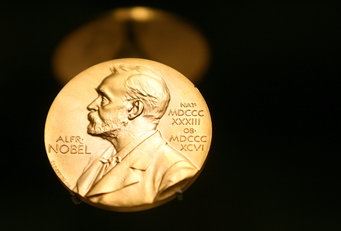Follow Nobel Prize week online
Nobel Prize festivities under Covid-19 conditions
The lectures, discussions, and concerts planned for the Nobel Prize award ceremony will take place virtually in this year's event scheduled from 7 to 11 December. They can be followed online. The ceremonial presentations of the medals to the Max Planck Laureates, Nobel Prize winner Emmanuelle Charpentier from the Max Planck Research Center for the Science of Pathogens in Berlin and Nobel Prize winner Reinhard Genzel from the Max Planck Institute for Extraterrestrial Physics in Garching, cannot take place in Stockholm as usual.

The prizewinners will receive their Nobel Prize Medal and certificate at their respective places of residence, i.e. in Berlin and Munich. However, the presentation of the award will be recorded on video and shown on 10 December at the award ceremony in Stockholm. Tonight, Nobel Prize winner Emmanuelle Charpentier, who will be honoured together with Jennifer A. Doudna for her discovery of the CRISPR-Cas gene scissors, will receive her Nobel Prize Medal at the residence of the Swedish Ambassador in Berlin. Reinhard Genzel, who together with Andrea Ghez and Roger Penrose receives the Nobel Prize in Physics for the discovery of the black hole in the Milky Way, will be honoured one day later, on 8 December, in the Bavarian State Chancellery in Munich. "It is of course a great pity that Emmanuelle Charpentier and Reinhard Genzel will miss out on the festive award presentation by the Swedish King in Stockholm this year," regrets Martin Stratmann.
Live streamed Nobel Lectures
In the week of 7 December all Nobel Lectures will be streamed on nobelprize.org. The Nobel Lecture in Physics will take place on Tuesday at 9:00 am, the Nobel Lectures in Chemistry at 11:00 am. "A forty Year Journey" is the title of Reinhard Genzel's lecture: “So after 40 years, the galactic centre has been extremely helpful to Astronomy and to Physics. Two teams, the group of Andrea Ghez as well as my group, have used this to push ever further. And many questions remain or go beyond what we have now, but we now have evidence indeed that these objects (black holes), which were theoretically discussed by Roger Penrose and others, actually are realised in nature.”
Winning a new generation of scientists
“In this time of the pandemic, we are reminded of the fact that infectious diseases are the number two cause for disease-related deaths. And not only viral, but also bacterial infections are still a major concern”, Emmanuelle Charpentier emphasises. “As many colleagues are about to retire, we need to win new scientists to continue this kind of research.”
"Both Nobel Prizes demonstrate impressively what basic research is all about: they are generational projects, like the construction of cathedrals in the past. These outstanding scientific results are an expression of the cultural achievements that humanity is capable of - something that distinguishes us from all other species on this planet and that enables us to be so enormously adaptable," says Martin Stratmann. "From the view into the vastness of space down to the nano-level of molecular machines, that is the fascination of science.”
The Nobel Prize concert will be broadcast from Konserthuset Stockholm on the same day at 7:00 pm. Conductor Stéphane Denève will conduct the Royal Stockholm Philharmonic Orchestra. The soloist is the pianist Igor Levit. The concert, which will take place without an audience, will be broadcast live on nobelprize.org and the Swedish Academy of Sciences' YouTube channel.
Nobel Prize award ceremony in the times of corona
The highlight of the celebrations will be the Nobel Prize ceremony on 10 December at 4:30 pm in Stockholm. The Nobel Foundation will honour this year's prizewinners in the Golden Hall of Stockholm City Hall and will broadcast the video recordings of the medal ceremony. The broadcast can also be followed again worldwide via the digital channels of the Swedish Academy of Sciences.
Five Nobel Prize winners will participate online in this year's "Nobel Minds" panel discussion, where they will discuss the lessons of the corona pandemic: Michael Houghton (medicine), Emmanuelle Charpentier (chemistry), Andrea Ghez (physics), Paul R. Milgrom (economics) and Valerie Guarnieri (peace).
BA/HOR/HR












